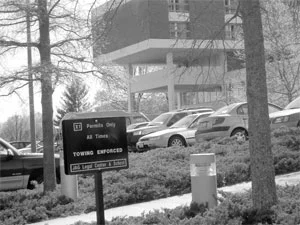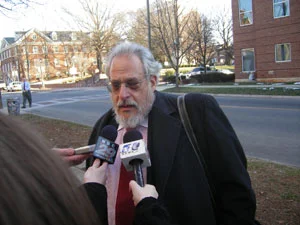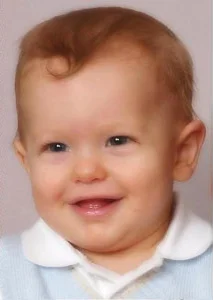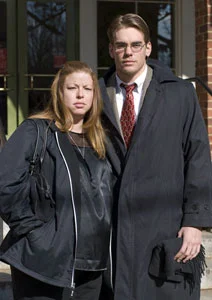The Perfect Storm
The Perfect Storm
The perfect storm: Family tragedy plays out in court
By LISA PROVENCE | [email protected]
Published online 9:00am Thursday Jan 31st, 2008 and in print issue #0705 dated Thursday Jan 31st, 2008
“Everyone in this courtroom agrees Raelyn Balfour killed Bryce Balfour,” said prosecutor Elizabeth Killeen when the three-day trial began January 23. “This little boy’s life did not have to end this way on a hospital gurney. That constitutes criminal negligence.”
And so began one of Charlottesville’s most painful trials – asking whether a mother who makes a fatal mistake has already paid the highest price – or should pay with her freedom.
The prosecution and defense agreed on one thing: the death of nine-month-old Bryce Balfour was not intentional. Where they disagreed was whether his mother, Raelyn Alene Balfour, 36, was guilty of criminal neglect resulting in involuntary manslaughter, which carries up to 10 years in prison.
Most facts of the case were not in dispute. On March 30, Balfour forgot to drop Bryce off at the babysitter’s on her way from her Ruckersville home into work at the Judge Advocate General’s School at UVA’s North Grounds. Then, after talking to the babysitter at 4pm, Balfour found Bryce still in the car at the JAG School. But by then, it was too late.
This was not the first time opposing counsel met in a high-profile case in Charlottesville Circuit Court. Top gun Alexandria attorney John Zwerling and Assistant Commonwealth’s Attorney Elizabeth Killeen had faced off three years earlier in the trial of Andrew Alston. But those facts were markedly different. Alston had been a UVA student when, during an altercation on 14th Street in 2003, he plunged a knife into firefighter Walker Sisk 18 times before fleeing the scene.
The Alston case provoked outrage when the jury, unswayed by the prosecution’s portrayal of Alston as a repeat local assailant (two weeks after killing Sisk, Alston escaped charges of assaulting a girlfriend by having her recant her allegations), sentenced him to three years for manslaughter. [CORRECTION: Alston’s jury was never told about his alleged assault or his alleged cover-up that followed-editor.]
In that trial, Killeen was second chair for the prosecution. This time, she sat alone facing Zwerling, his associate, Chris Leibig, and Dana Slater across the room beside Balfour, visibly pregnant and often visibly upset.
The series of events leading up to baby Bryce’s death were interpreted by the prosecution as indicative of Balfour’s “gross negligence” and by the defense as her “tragic flaw”- an inability to say no to people who needed her help.
The night before the tragedy in the parking lot, Erika Conely, a friend whose husband was serving overseas in the military, had a sick dog and needed someone to look after her baby. Raelyn Balfour, or “Lyn” as friends call her, was the fourth person Conely called, and she came over around 9pm.
During the two hours Balfour babysat for Conely, she consumed one or two beers, she told Conely, who testified that Balfour later asked her not to mention the beer to the police.
“The babysitting is to show Balfour’s tendency to overextend herself,” said Killeen, who also raised her eyebrows at the fact that Balfour drank beer while babysitting.
Balfour didn’t get to sleep until 1am, and after being awakened by Bryce around 3am, she went back to bed. But essentially she began her day with just three hours of sleep. Killeen described the sleep deprivation as part of a “pattern.”
“This was not ‘I’m going to the movies’ or ‘I’m out playing cards,’” countered Zwerling. “This was a call from a neighbor, a woman whose husband was in Iraq.”
The 1998 requirement that automobiles sold in America be equipped with dual front seat airbags was accompanied by a startling rise in deaths and injuries to young children by the airbags themselves. And so American babies began migrating from the traditional spot in the passenger seat to less visible placement in the back.
Unfortunately, the move has had devastating consequences, according to Kids and Cars, a national advocacy group that tracks hot-car fatalities.
“There’s been a tenfold increase,” says Janette Fennell, Kids and Cars’ founder. Between 1990 and 1992, a total of 11 children died of hyperthermia after being left or trapped in cars. From 2004-2006, the number was 110.
In 2007, the number of deaths was 36, mostly in southern states and mostly between the months of April and October. But what of all the babies left in cars not hit by scorching sun- those under trees or in parking garages?
Experts the Hook consulted claim that happens, but they declined to guess how often. And the parent who puts in a full day of work and returns to his car to discover a traumatized, hungry- but still living- child strapped into a car seat has yet to call a press conference.
Not long before the fateful morning, the Balfours had purchased a new car seat for their growing nine-month-old. However, they weren’t satisfied that the new seat, located in the usual spot behind the passenger seat, was properly secured. So Bryce’s dad, Jarrett Balfour, brought out the old seat that morning, and placed the baby directly behind his mom, he testified.
“This was the only time an empty car seat didn’t mean there was no baby in the car,” Zwerling told the 12 men and women of the jury.
And there was another key change to the routine that morning. Normally, Jarrett Balfour drove himself to work at the National Ground Intelligence Center, or NGIC. But because his sister-in-law had had an accident and was using his car, the Balfours found themselves with just one car that week.
After dropping her husband off at NGIC, Raelyn Balfour headed down Route 29 to her job at the JAG School. On the way, engaged in a 29-minute phone call with a nephew who needed money, she drove past Forest Lakes South, the neighborhood where her babysitter lived.
“She had a family discussion, a serious, emotional discussion about money during rush hour,” said Killeen.
“The family was suffering from crisis,” said Zwerling. “Who do they call? Raelyn.” And her offer to lend money was out of concern, Zwerling added. “She’s not doing it out of callous disregard.”
Upon reaching the JAG School around 8:30am, where she worked as a transportation and travel coordinator for the Army’s lawyers, Balfour found herself immediately plunged into a work crisis involving a mix-up with airline tickets for the family of a fallen soldier.
Her supervisor, Major Kevin Anderson, testified that it was push time at the school. Two graduating classes were getting ready to leave, and Balfour was responsible for coordinating their household moves and travel.
“Ms. Balfour had a lot of responsibility,” said the Major. “Stressed out is the best way to describe it.”
Balfour had received top ratings in her job evaluations, but her boss also discussed time management with her. She’d accumulated a lot of comp time which she used to take the baby to doctor’s appointments, he said.
Like the Major, husband Jarrett Balfour- who flew in from his new job in Iraq- found himself called as a prosecution witness, even though his sympathy clearly lay with the defendant. “I came here,” he told the court, “to support my wife.”
Babysitter Whitney Huff called Balfour at work at 9:42am to ask where Bryce was. Killeen argued that Balfour ignored the message until around 3pm. “She chose to focus on work,” said Killeen. “That’s unacceptable. That is gross negligence.”
And Killeen was incredulous that Balfour didn’t remember for seven-and-a-half hours that she hadn’t dropped off Bryce. Indeed, testimony indicated she didn’t remember at all, despite- as the prosecutor mentioned at least three times during the trial- the fact that Balfour had a picture of Bryce in her office.
According to the defense, Balfour didn’t discover she had a message on her personal cell phone until around 3pm when she saw that Huff had called. Testimony indicated that Balfour then left a message for Huff, but the two didn’t speak directly until 3:58pm.
“I’m calling to check on Bryce,” Huff said in court. “‘What do you mean?’” she said Balfour asked. “‘You’ve got him. Oh, my god.’”
As has been recounted consistently from the first day, what happened next was every parent’s nightmare. Balfour raced to the parking lot where coworkers and rescue workers found her screaming and performing CPR on her baby. In court, Balfour sobbed as the 911 tape played with her voice begging, “No, no, please. Oh, no, please. Oh, help me.”
Like some in the community, the prosecutor- despite the drama- pushed for punishment.
“She put herself in a situation where she was able to forget her infant,” Killeen told the jurors. Even with the stress and tension at work, “You still have to take care of your children,” she said.
“Ms. Balfour doesn’t get a pass because she did this to her own child as opposed to someone else’s child,” continued Killeen, calling Balfour’s actions “gross, wanton, and culpable neglect.”
Zwerling offered another angle.
“She came to believe she’d dropped him off,” he said. “Bryce was in a place where he was safe, sound, and happy, so she didn’t have to worry. Not remembering is easy to understand when she believed he was at daycare.”
The high on March 30 was 66 degrees, but an expert testified that the inside of a car could soar to over 100 within an hour. Medical examiner Kevin Whaley performed the autopsy on Bryce, and said he died from hyperthermia, most likely in the first half of the day. The infant had marked dehydration, and his core temperature when he was taken to the hospital was 110 degrees.
This type of accident, though heartbreakingly tragic, is no longer rare: nearly 400 children have died the same way in the past decade. And as Kids and Cars’ Fennell points out, the mistake is more often made not by parents who abuse their kids, but by “people who adore their children, people who would lay down in front of a car to save their child’s life.”
Mark Warschauer is such a person. After coping with multiple rounds of in vitro fertilization, Warschauer and his wife, Keiko, had a son, Michael Kai “Mikey” Warschauer in October 2002. They documented his infancy on a website, sent updates to friends and family, took parenting classes. But all their devotion didn’t save Mikey’s life.
On August 8, 2003, when Mikey was 10 months old, Warshauer, a technology and education professor, headed to work at the University of California-Irvine. For several months, he describes on a website, he’d been dropping Mikey off at daycare “a couple of days” each week. On those days, the route he took was just one turn different from his standard commute.
Like Balfour, who’d been up late babysitting the night before Bryce died, Warshauer was also sleep-deprived the night before Mikey died. Keiko was in the process of weaning Mikey from breastfeeding, and as a result, Warshauer was the one to attend to Mikey when he awoke several times during the night. In addition, he had stayed up late the previous night helping Keiko, a political science professor, with a work project.
“On that day, after a change in my morning routine,” he writes, “I lost my concentration and drove to work instead of daycare.” When he emerged from his office three hours later, he discovered paramedics already on the scene and Mikey on a stretcher.
Unlike Balfour, Warschauer was never charged: California prosecutors decided Mikey’s death was accidental.
Reached by email, Warschauer declined comment, describing the years he has spent making public service announcements, doing public speaking, and being interviewed for news stories as “extremely emotionally draining.”
Part of the drain may be the public backlash.
Following stories about such instances, newspaper message boards fill with vitriolic posts from readers who seem eager to see the bereaved parent punished.
“I’d never forget my own child!” or “It’s simply not possible for a loving parent to forget her child,” insist such writers. While many call for lengthy prison terms for the offending parent, some go a step further, calling for the parent to suffer an identical death.
But Fennell believes such critics need to step back.
“Given the right set of circumstances,” she says, “it could happen to anyone.”
She’s not the only one making that claim. David Diamond, a psychology professor at the University of South Florida and neuroscience researcher for the Veterans Administration, says the human brain does not perform well under stress.
“You can actually see the brain atrophy in response to stress,” says Diamond, who was in Charlottesville as a possible defense witness in Balfour’s case.
“I’ve seen people respond pretty callously, and I think it’s insensitive,” he says. “They’re not aware that the brain has a way of absolutely focusing on the moment when we get stressed.”
He says Balfour’s exhaustion, the stressful phone call from her nephew, and the unexpectedly invisible location of Bryce’s car seat behind the driver’s seat short-circuited her “prefrontal cortex”- where higher decisions are made- and activated the lower functioning basal ganglia, the part of the brain that enables drivers to get home on “autopilot” with little or no memory of the trip.
Those things, coupled with the added stress as soon as she arrived at work, created “the perfect storm,” says Diamond, and enabled a doting mother to forget her beloved child.
Raelyn Balfour had never been in trouble before. An 18-year U.S. Army veteran, she served in Desert Storm and Bosnia, and was awarded a Bronze Star for serving in Iraq in 2004 and 2005. She’s now in the Army Reserves.
“This is a tragedy,” said Zwerling. “Each tragic character has a tragic flaw. Lyn had a tragic flaw,” epitomized, he said, by the tag at the bottom of her emails: “No is not an option. Tell me how hard I have to work to get a yes. The fighting men and women deserve no less.”
“She couldn’t say no,” Zwerling said. “She took on too much, and it ruined her life. Her desire to help was not callous disregard. It was driven by a motive to do good. Her desire to do good should not be turned into a crime.”
Throughout the emotional trial, the courtroom benches behind Balfour were filled with family members, friends, and coworkers like her supervisor, Kevin Anderson, who returned to court January 25 after he’d testified the day before.
Colonel Robert Korpanty is Balfour’s Army Reserve officer. He flew in from Illinois to be at the trial. “It shouldn’t have ever come to trial,” he said as the jury deliberated.
After just 90 minutes, the jury was back. One juror later told WINA radio that the first vote was 11-1, and even the holdout wasn’t holding out for guilt- just undecided.
When the jury’s “not guilty” verdict was read, the courtroom erupted in sobs and applause, the latter hastily reprimanded by Judge Edward Hogshire.
“Bittersweet,” is how Jarrett Balfour’s mother, Sari Balfour, described the verdict. “They’ve been through such an incredible amount of grief but have not been able to grieve. It’s such a relief to be able to grieve.”
Lyn Balfour made a brief statement outside the courthouse, thanking the community and vowing, through education, to make sure her son’s death was not in vain.
“She was of the mind it could never happen to her,” said Zwerling. “It wasn’t an intentional thing. All the other stuff she was doing was to help other people.”
He acknowledged the difficulty of defending a case with a dead baby where the mother is responsible. “She’s going to have guilt the rest of her life,” he said.
“We were very pleased the jury made a decision on behalf of the community,” said Killeen, standing outside amid a gaggle of reporters along with her boss, Commonwealth’s Attorney Dave Chapman. “This was a case that needed to go before a jury. This was a very difficult, very emotional case. It’s not usual to go on trial for a crime everyone knows is accidental.”
“Sometimes the community wins by an acquittal,” added Chapman.
“The jury saw the whole incident as a tragedy,” said juror Ezekiel Best. “The phone calls- we determined from the evidence that she was forgetful. We saw it as a series of unfortunate errors. We didn’t see it as being knowingly callous in putting Bryce in danger, so we voted to acquit.”
Best says the hardest part of the trial was when the state put up slides of a dead nine-month-old baby and hearing the tapes of Balfour calling 911 and making her initial statement to police. “That,” he says, “was gut wrenching.”
Best and another juror, who asked that his name not be used, said they had some doubts about whether the case should have come to trial.
“Several of us said leaving the jury room, ‘Why are we here?’” says Best. “‘Why are our tax dollars being wasted?’”
In an interview a day after the verdict, Balfour seems to agree. Originally charged with second degree murder and felony child neglect the day after Bryce was buried, she was released on $25,000 bond. Her mugshot appeared on news sites that transmitted her image all over the world.
“My husband and I are going through the darkest phase of our lives,” Balfour said, “and they treated me like a habitual offender.”
Balfour says her defense cost $135,000. Unlike some couples who divorce after such tragedies, the Balfours have decided to follow through on plans for another child. However, there will be a family separation because, to pay their bills, her husband has signed up for a two-year civilian commitment in Iraq.
“The only thing I’m truly angry with is the Commonwealth,” she says. “I do understand they were looking out for Bryce. They knew from day one there were two car seats, and my son was behind me. They knew I’d dropped my husband off at work and that was not a normal stop for me.”
For Balfour, who had put safety latches and outlet covers all over their house before the accident, the irony is that a device is available that sets off an alarm if a child is left in the car. Unfortunately, she didn’t know about it.
“I’ve always been very religious,” Balfour said. “I do believe in God. And I’ve wondered, why did this happen to Jarrett and me? We’re good parents.”
The support inside and outside the courtroom seemed to attest to that fact.
“People at the JAG School created my son’s funeral program, with input from us,” she said. “They put together a DVD slide show. That’s why I could get up in the morning, why I could go to work.
“The prosecution attempted to use that against me, and it didn’t work. I didn’t know how the trial would go, but I had the support. People came from Fort Bragg, Michigan, Norfolk, Washington. Some drove here every day.”
One life change Balfour has already made has been volunteering with Kids and Cars. She says she has peppered Central Virginia stores with flyers urging parents to prevent such accidents. And she says she’s planning to write letters and testify before Congress.
Appearing with her husband on the ABC program Good Morning America on Monday, January 28, she tearfully told a national television audience that she’ll be asking God for forgiveness until the day she dies.
“I have a plan,” she tells the Hook. “A few days after my son died, I woke up at three in the morning and had this idea. I’m originally from Michigan, and I have friends who work in the auto industry and on car parts. We have a sensor in cars now for airbags. If the weight is not enough, it automatically shuts off. Why can’t that sensor tell if an adult or child is in the seat, and an alarm go off?”
Such technology may already exist. Volvo recently announced that it will offer an optional monitor that indicates whether there’s a heartbeat inside a car. Initially marketed to nervous drivers fearing an intruder, the device also appears to answer Balfour’s dream.
“It’s hard not to feel responsible for other children who’ve died since Bryce,” she says.
Even before Bryce’s death, she and Jarrett planned to have a second child. Three weeks ago, she resigned her job at the JAG School, and her baby is due in April.
“One of the reasons I’m being a homemaker now,” Balfour said, “is because if I were at work and the phone rings from the babysitter, I’ll think it’s the worst. I will always think the worst now. I’d be on pins and needles at work.”
For Balfour, the horror lives on in so many ways.
“I was one of the parents who said, ‘How can you do that? It’s not possible.’ I have people who tell me they don’t get in their car without thinking about me,” she said.
“As [prosecutor] Killeen said, I won’t ever hear my son say ‘I love you,’” she said. “I won’t see him grow up. I won’t see him graduate- all because of my mistake.”
And how do you explain the death of your child when you were responsible?
“People ask,’” she said, “‘how many children do you have?’ That explanation is going to be relived over and over the rest of my life.”
-with additional reporting by Laura Burns and Courteney Stuart

Bryce Balfour died in the parking lot of the Judge Advocate General’s School on UVA’s North Grounds. Some of his mother’s coworkers attended her trial to show support
PHOTO BY LISA PROVENCE
Assistant Commonwealth’s Attorney Elizabeth Killeen prosecuted the case last week. Her boss, Dave Chapman, said, “Sometimes the community wins by an acquittal.”
PHOTO BY HAWES SPENCER

Attorney John Zwerling defended other Charlottesville clients, including UVA stabber Andrew Alston and attorney Debbie Wyatt.
PHOTO BY LISA PROVENCE

/Bryce Alan Balfour. June 18, 2006- March 30, 2007.

“It’s a relief,” Balfour says of the verdict, “but I can’t be happy because my son won’t be here, and because I’ll never see him again until I go to heaven.”
PHOTO BY JAY KUHLMANN


